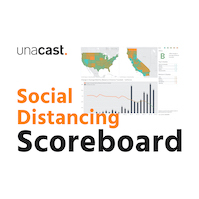
Unacast Launches Social Distancing Scoreboard
Our goal in developing this and our COVID-19 Toolkit is to empower organizations to unearth reliable and valuable information to guide critical decision making and planning in relation to COVID-19 containment.
NEW YORK (PRWEB)
March 27, 2020
Unacast, an award-winning location data and analytics firm, launched a Social Distancing Scoreboard this week as the first component of its COVID-19 Toolkit. Unacast created this pro bono offering, powered by its Real World Graph® data engine, to help public health experts, policy makers, academics, community leaders and businesses in retail and real estate gain accurate insights into current public behavior and unearth trends for future scenarios related to the spread of COVID-19.
In the wake of the global pandemic, the World Health Organization and the CDC have advised social distancing as a containment method to slow the spread of the disease.
Unacast applied geospatial human mobility insights with its proprietary tools to create an interactive map showing mobility trends by county or by state as a way to raise awareness of and reinforce the importance of social distancing in relation to slowing the spread of COVID-19. The Scorecard assigns a letter grade of A through F to all states and counties in relation to social distancing behavior. Using the change in distance traveled prior to COVID-19 in comparison to present day, areas that observe at least a 40% decrease in average distance traveled are assigned a grade of A, while those that exhibit less than 10% decrease or increase are assigned an F. Letter grades are then compared to the number of new COVID-19 cases reported in those areas to help users draw conclusions between social distancing behavior and virus spread over time. Unacast will be adding more features to the Social Distancing Scoreboard in the coming days and weeks to further nuance the output.
“The public response this week has been remarkable and validates our belief that presenting aggregated information on social distancing behavior will help organizations and businesses better understand public behavior in a post COVID-19 world, and is a powerful tool to help mitigate the pandemic spread. Our goal in developing this and our COVID-19 Toolkit is to empower organizations to unearth reliable and valuable information to guide critical decision making and planning in relation to COVID-19 containment,” said Thomas Walle, CEO and Co-founder at Unacast. “We are updating the Scorecard and enhancing this COVID-19 Toolkit to provide the most timely and accurate information possible, with the hope of ultimately saving lives.”
Other components of Unacast’s COVID-19 Toolkit that will be available shortly include a Value Impact Tracker that compares traffic patterns in specific places of interest to the news cycle; Origin-Destination Flux, which measures changes in human mobility patterns of larger geographic areas; and Custom Data Analysis for organizations that require specific datasets.
Unacast is developing the Covid-19 Toolkit with public datasets, as well as aggregate mobility and anonymous device data from tens of millions of devices. Unacast’s proprietary technology then extrapolates the results to show trends by county and by state. As with all Unacast technology, the Toolkit follows GDPR and CCPA guidelines.
About Unacast
Unacast is an award-winning human mobility data company that harnesses anonymous device location data, map data, and strategic intelligence to tackle business challenges for the retail, real estate, tourism, transportation, and marketing industries. With its flagship product “The Real World Graph®”, it provides innovative solutions and insights to operational challenges for companies of any size or shape. Unacast was founded in 2014 with offices in New York and Oslo, Norway. In 2019, Unacast was awarded the #1 small company to work in NYC by Built In NYC and received Street Fights’ Most Innovative Use of Geospatial Technology award.
Share article on social media or email:

